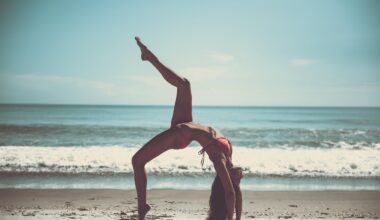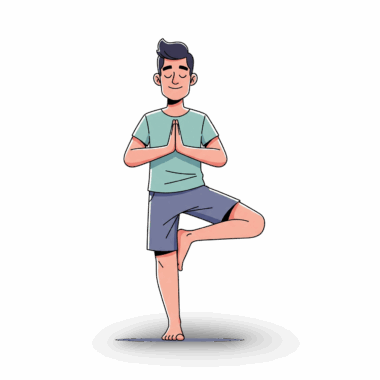Managing Stress on the Road: Mental Fitness Tips for Travelers
Traveling can be an exhilarating experience, but it can also bring significant stress. Disturbances in routine, unfamiliar environments, and travel-related decisions can affect mental health. Managing stress effectively while traveling is crucial for enjoying the journey. Start by acknowledging the stressors unique to your trip. Is it the lack of sleep, flight delays, or difficulties in navigating new cultures? Recognizing these factors is the first step in incorporating mental fitness strategies into your travels. Mindfulness can be your greatest ally. Practicing mindfulness allows you to maintain focus on the present moment. Engage in deep breathing exercises when anxiety arises. Remember, it is about flow, not perfection. Having a travel companion can lighten the load, so communicate openly about any concerns or stressors. Most importantly, remember that adapting to change is a skill. Embrace flexibility, as travel is inherently unpredictable. Finally, ensure you fill downtime with activities that recharge you, like reading or journaling. Mental fitness is all about maintaining balance regardless of your surroundings.
Planning Ahead for a Stress-Free Trip
Planning your trip is essential for managing stress effectively. Create a detailed itinerary that includes important information such as flight schedules, hotel reservations, and local attractions. Share this itinerary with family or friends. Consider setting realistic expectations for your travel experiences. Overpacking your schedule can lead to exhaustion and disappointment. Aim to include downtime, where you can relax and enjoy your surroundings at a leisurely pace. Make sure to prepare for different time zones as well. Adjusting your sleeping schedule a few days ahead can make a significant difference. Furthermore, always have a Plan B. Travel can be unpredictable, and having alternative plans will reduce stress if things don’t go as planned. Engage in research to familiarize yourself with each destination. Knowing local customs and language basics can ease anxiety. Don’t forget to download useful apps for navigation and translation. Adequate packing is also a part of planning. Pack light but smart, ensuring you have essential items to comfort you, like your preferred snacks or personal care products. Lastly, it’s essential to stay hydrated and eat healthily while on the road.
Finding time for fitness while traveling is vital for mental well-being. Aim to incorporate physical activity into your travel itinerary. Whether it’s a morning jog, yoga, or even dancing – every little bit counts. Exercise releases endorphins, which help combat stress and enhance happiness. Look for local gyms or fitness classes that offer a unique experience in your travel destination. Even simple activities like walking tours can provide both physical exercise and a way to explore the area. Remember to set achievable goals. Short, efficient workouts can yield significant mental benefits. Utilize apps that offer guidance and motivation for your workouts while traveling. Additionally, consider packing resistance bands or portable workout tools. They can easily fit into your luggage and can help you maintain your fitness routine. It’s also essential to embrace a healthy diet. While trying local foods, complement your meals with nutrient-dense snacks to fuel your body. Always listen to your body—if you need rest, prioritize it. Your mental fitness depends as much on your physical state as it does on your mindset while traveling. Stay active, enjoy the exploration, and be kind to yourself.
Mindfulness Practices to Try
Integrating mindfulness techniques during your travels can greatly alleviate stress. Start your day with affirmations or gratitude practices. A quick morning session focusing on what you are thankful for can set a positive tone for the day. Additionally, try guided meditation apps to maintain emotional stability. Allocate some quiet time each day to visualize your surroundings fully. What do you hear around you? What do you see? Engage your senses deeply and focus on appreciating the moment. During moments of stress, practice deep breathing exercises. Inhale deeply through your nose and exhale slowly through your mouth. Repeat this several times. By managing your breath, you can actively reduce anxiety and regain control. Journaling can also be an expedition into self-discovery, documenting feelings and experiences. Reflecting on your travel adventures can create a revised perspective of challenges faced and overcome. Consider setting daily intentions that resonate with your travel plans. This practice can help ground your thoughts. Finally, create small rituals, like a favorite morning beverage while journaling, to provide comfort and familiarity amid change. Travel is a mind-expanding journey that demands a flexible mindset.
Healthy eating while traveling contributes significantly to mental fitness. It’s easy to succumb to the temptations of fast food and sugary snacks on the go, yet these choices can lead to irritability and fatigue. Aim to maintain a balanced diet rich in proteins, whole grains, and fresh fruits and vegetables. Plan ahead for meals, scouting local restaurants that offer nutritious options. Don’t hesitate to pack healthy snacks for your journey – nut bars, trail mix, or fruits can help you avoid unhealthy cravings. Hydration is also key; carry a reusable water bottle wherever you go to ensure you’re drinking enough water. Additionally, it’s essential to indulge responsibly. Try local specialties but also be mindful of portions. Enjoy the cultural experience of food while maintaining moderation. If circumstances don’t allow for healthy eating, don’t beat yourself up. Acknowledge that travel is about experiences and indulge in treats with joy. Balance is an essential element, so aim for overall wellness rather than perfection. Remember to listen to your body’s needs. Education on nutrition while traveling can empower you to make better choices. Healthy eating on the road fosters vitality and improves emotional well-being.
Utilizing Technology for Mental Wellness
In today’s digital age, technology can significantly contribute to your mental fitness during travels. Harness the power of mental wellness apps that guide meditation, relaxation techniques, and breathing exercises. These apps can provide immediate assistance during stressful moments and help you regain focus. Furthermore, use travel apps for planning, ensuring everything from transport to accommodation is streamlined. This minimizes stressors related to logistics. Consider digital journals, promoting reflection on your experiences daily. It offers wonderful opportunities for mindfulness while documenting your journey. Stay connected to family and friends through social media platforms and messaging apps, sharing highlights and ensuring emotional support. Communication with loved ones can mitigate feelings of loneliness, especially during extended travels. Online therapy services are also available for those seeking professional support while away. Mental health is just as important as physical fitness, so prioritize resources that resonate with you. Remember to disconnect from devices when needed; finding balance is crucial for mental health. Schedule time away from screens to immerse yourself in the real-world adventures around you. Technology is most powerful when it doesn’t interfere with life’s genuine experiences.
Traveling provides unique opportunities for personal growth, and managing stress effectively can enhance these experiences. Embrace the entirety of your journey, from challenges to rewarding moments. Creating connections with fellow travelers can also foster a sense of community. Shared experiences can help alleviate stress and provide fresh perspectives on challenges encountered. One powerful technique is embracing spontaneity. Allow yourself moments of unplanned adventure; wander into a new café or join local activities. These opportunities often lead to memorable experiences that enrich your travels. On the flip side, if anxiety arises from unexpected disruptions, remind yourself that it’s part of the adventure. Reframe your thoughts—how does this add to your story? Focusing on adaptability can transform stress into excitement. Consider documenting lessons learned from experiences encountered during your trip. Reflection promotes growth and helps ease stress from adverse events. Finding joy in moments of uncertainty can enhance your overall travel experience. Remember to celebrate small achievements and victories throughout your journey, reinforcing positivity. Travel is a continuous process of learning, and your mental fitness toolkit will grow with each adventure you undertake.
Ensure you prioritize your mental well-being by integrating these tips into your travels. Each step you take to manage stress empowers and enhances your travel experience. Remember that it’s perfectly normal to feel stress on the road. Embrace it as part of your adventure, but don’t allow it to control you. Utilize mindfulness techniques, engage in regular physical activity, and eat healthily. Seek and embrace support through technology and connections with fellow travelers. Reflect on your experiences, and maintain a sense of adventure. Establish routines amidst the chaos and create a balanced travel schedule. Your mental fitness significantly impacts enjoyment levels while traveling. Always strive to implement practices that resonate with you and your lifestyle. Traveling should be a joyful experience, nurturing personal growth and new perspectives. Find joy in discovery amidst the chaos of travel, and remember to practice forgiveness when things don’t go as planned. Together, these practices can revolutionize your travel experiences, making each trip balance your joy and mental resilience. Your adventure awaits, and with the right mindset tools and strategies, you can navigate through stress while exploring the wonders of the world.





